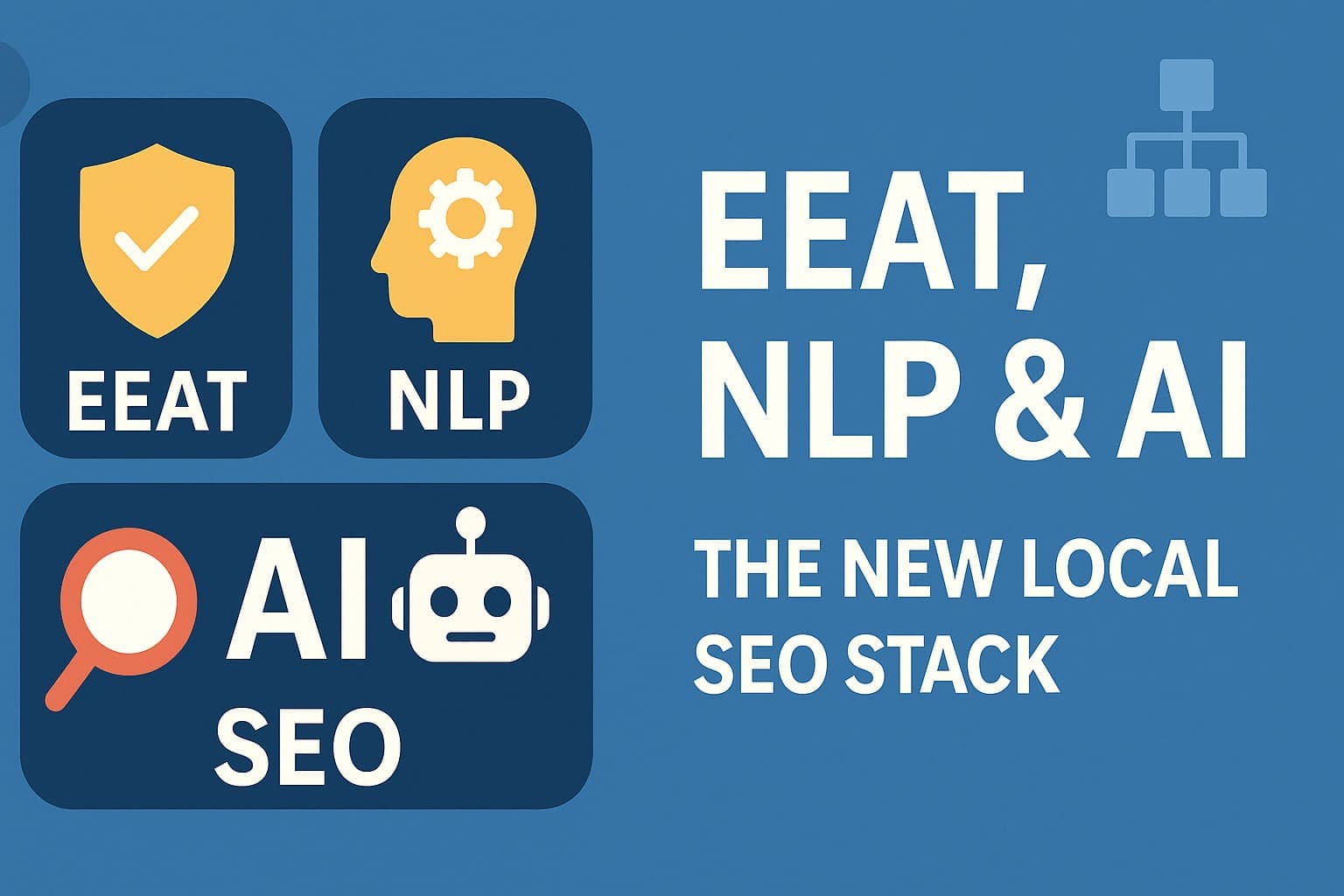As the digital landscape continues to evolve, so do the strategies required for local businesses to rank higher on search engines. With the introduction of concepts like EEAT (Expertise, Authoritativeness, and Trustworthiness), NLP (Natural Language Processing), and AI (Artificial Intelligence), businesses in Canada must adopt a more sophisticated approach to their SEO strategies. These technologies are not just enhancing the user experience but are also reshaping the way local SEO is done.
In this blog post, we will explore what EEAT, NLP, and AI mean for local businesses in Canada, how they’re influencing SEO practices, and the best ways to incorporate them into your SEO strategy to increase visibility, drive traffic, and improve conversion rates.
What is EEAT in SEO?
EEAT stands for Expertise, Authoritativeness, and Trustworthiness. It is a concept that Google uses to assess the quality of content and rank websites accordingly. For local businesses in Canada, this is especially important as Google’s algorithms are designed to favor content that comes from reputable sources with high expertise in a particular domain.

1. Expertise
Expertise refers to the knowledge and skill demonstrated in a particular field or industry. When optimizing your local business for SEO, it’s essential that your content reflects professionalism and knowledge. This could involve:
- Detailed blogs or articles: Share in-depth content that showcases your knowledge about your business and industry.
- Staff bios: Highlight the expertise of your team, including their qualifications and experience.
- Customer case studies or testimonials: Demonstrate how your business has helped customers solve specific problems.
2. Authoritativeness
Authoritativeness is about how recognized your business or website is in your field. This can be improved through:
- Quality backlinks: Building relationships with authoritative sites and obtaining quality backlinks.
- Social proof: Having positive reviews, customer testimonials, and endorsements on social media helps in building authority.
- Brand recognition: Building a recognizable and trustworthy brand will improve your site’s authority.
3. Trustworthiness
Trustworthiness is crucial in establishing a long-term online presence. Google prioritizes websites that can be trusted, especially for topics related to health, finance, or safety. For local businesses, this can be achieved by:
- Secure website (HTTPS): Ensuring your website has an SSL certificate and is secure for visitors.
- Clear and transparent contact information: Display accurate business details, such as a physical address and phone number, on your website.
- Authentic reviews: Encouraging customers to leave honest, detailed reviews and engaging with them in a transparent manner.
How NLP is Revolutionizing SEO
Natural Language Processing (NLP) is a branch of AI that focuses on how computers understand, interpret, and generate human language. It has become an essential part of modern search engines like Google, which uses NLP to understand not just the keywords on a page but also the context and intent behind a query. For local businesses in Canada, NLP opens up new ways to optimize content and engage users more effectively.
1. Keyword Optimization and Semantic Search
In the past, SEO heavily relied on specific keywords. However, with NLP, search engines have become better at understanding semantic search. This means Google can now understand the meaning behind a query rather than just matching exact words.
For example, if a user searches for “best vegan restaurants in Toronto”, NLP enables Google to understand the broader concept behind the search and display results for vegan eateries even if the search term doesn’t exactly match what’s on a business’s website.
For local businesses, this shift means that SEO should focus on:
- Topic relevance: Rather than stuffing keywords, businesses should focus on content that answers specific questions and provides value.
- Natural language content: Writing in a conversational tone, answering common questions, and using related terms helps improve rankings.
2. Voice Search Optimization
NLP is also instrumental in the rise of voice search, a key trend in local SEO. As voice search queries are typically longer and more conversational than text-based queries, businesses need to adjust their SEO strategy accordingly. Optimizing for voice search involves:
- Conversational content: Using natural language in content and FAQs that answer questions users are likely to ask with their voice-enabled devices.
- Long-tail keywords: Voice searches often contain longer phrases. For example, instead of “pizza near me,” a voice search might be “Where can I get the best pizza near me right now?”
By using NLP, businesses can ensure their content is optimized for both written and spoken queries, broadening their reach across multiple search types.
3. Content Generation with NLP
AI tools powered by NLP, such as ChatGPT, can assist local businesses by generating content that aligns with search intent. For example, an AI tool can help craft blog posts, product descriptions, or customer support FAQs that are natural, engaging, and relevant to the user. This not only saves time but also ensures the content resonates with both search engines and users.
The Role of AI in Modern SEO for Local Businesses
Artificial Intelligence (AI) has been a driving force in the evolution of SEO. AI tools and technologies are making SEO smarter and more efficient, and they’re helping local businesses in Canada gain a competitive edge.
1. AI-Powered SEO Tools
AI-powered tools like SEMrush, Moz, and Ahrefs offer valuable insights into how local businesses can improve their SEO. These tools use AI to:
- Analyze competitors: AI can track competitors’ SEO strategies and help businesses understand what works and what doesn’t.
- Predict trends: AI can identify emerging trends in search behavior, allowing businesses to stay ahead of the curve.
- Automate tasks: AI tools can automate repetitive SEO tasks such as tracking rankings, analyzing traffic, and generating reports, freeing up time for businesses to focus on other aspects.
2. AI in User Experience Optimization
AI can help businesses optimize their websites by focusing on user experience (UX) – an important factor in SEO rankings. Websites that provide smooth, engaging, and personalized experiences are more likely to rank higher in search engines.
AI can:
- Personalize content: AI can analyze users’ browsing patterns and offer personalized content recommendations based on their interests.
- Improve site speed: AI can optimize website speed by automatically adjusting image sizes, scripts, and other elements that slow down load times.
- Improve mobile optimization: AI tools can help businesses optimize their websites for mobile devices, ensuring a seamless experience across all platforms.
3. AI in Content Strategy
AI is also transforming content creation for local businesses. By leveraging AI technologies, businesses can create content that aligns with their target audience’s preferences and search intent. AI can:
- Generate keyword suggestions: AI-powered content tools can provide insights into which keywords are most relevant to a business’s niche and help create content around them.
- Optimize existing content: AI can scan your existing content for readability, keyword density, and SEO best practices, ensuring that it is fully optimized for both search engines and users.
- Track content performance: AI can track how well specific pieces of content perform, providing insights on what needs to be improved or updated.
Best Practices for Implementing EEAT, NLP & AI in Local SEO
To leverage EEAT, NLP, and AI effectively for local SEO, here are some best practices that businesses in Canada should follow:
1. Focus on User Intent and Experience
Incorporate user intent and ensure that your website offers a great user experience. Whether it’s answering questions or providing valuable content, businesses should always focus on what users are searching for and how they interact with content.
2. Adopt NLP for Content Creation
Integrate NLP tools to create content that resonates with users. Use NLP to answer specific queries in a conversational tone, optimize for long-tail keywords, and provide detailed answers that improve your chances of appearing in featured snippets.
3. Ensure Trustworthiness with EEAT
Building trust is key for local businesses. Invest in creating high-quality, authoritative content that reflects your expertise. Engage with your audience through reviews, testimonials, and transparent business practices to strengthen your authority.
4. Leverage AI to Automate SEO Tasks
Automate repetitive SEO tasks with AI-powered tools. AI can help track rankings, analyze traffic, and generate reports that save time and improve the efficiency of your SEO strategy.
5. Optimize for Mobile and Voice Search
Since voice search and mobile searches are growing, ensure that your website is optimized for both. Focus on speed, responsiveness, and conversational keywords to meet the growing demands of mobile and voice search users.
Read Also : How to Optimize Your Business for ‘Near Me’ Searches with AI & NLP
Conclusion
The future of local SEO is closely tied to advancements in EEAT, NLP, and AI technologies. Local businesses in Canada need to embrace these technologies to stay ahead in the competitive digital marketplace. By focusing on expertise, authority, trust, and optimizing for user intent, conversational search, and AI-powered tools, businesses can significantly improve their visibility in local search results. As AI and NLP continue to evolve, the potential for local businesses to engage with customers in more meaningful ways will only grow, making it essential to stay updated on these technological advancements for sustained success.
About the Author

Rajesh Jat
SEO Specialist at ImmortalSEO with expertise in technical SEO and content optimization.
View all posts